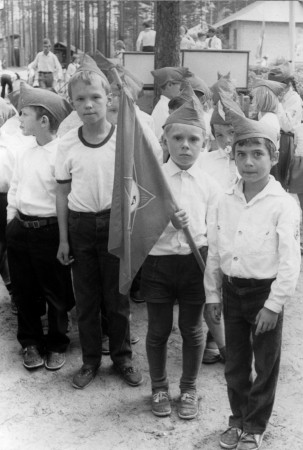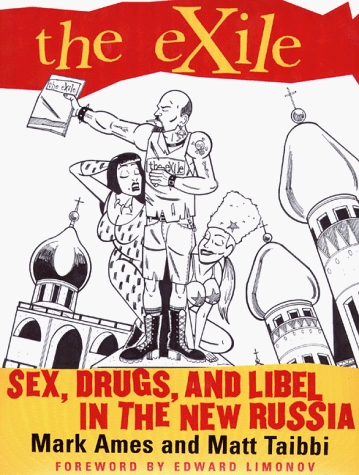
A few weeks ago, I went to see a new Russian horror film called S.S.D. (the acronym translates to “Death to Soviet Children”) about a bunch of annoying Moscow urbanites who get slaughtered while shooting a reality TV show in an abandoned Soviet summer camp. I don’t usually get excited about new film releases in this country. I’ve been disappointed too many times and now try to avoid them as much as possible. But this time was different, this time I thought the movie couldn’t lose. It had too much potential. If you’ve ever spent time in a real Soviet pioneer camp, like I have, you’d be excited, too.
See, I left Russia at a young age, but not before I had the distinct pleasure of spending two traumatizing summers at a Soviet summer camp on the outskirts of St. Petersburg. I didn’t know it at the time, but I was being introduced to the gulag experience, minus the hard labor and freezing temperatures. Everything else—the food, the housing, the stern oversight, the strict parent visitation rights (a few hours every month), the lack of sanitary washing conditions, the Soviet ideology indoctrination and the recreational activities—are pretty much the same, except bite-sized. You know, for kids. It was the type of torturous existence that would make kids beg for Jason to cleave them in half to end their misery (if only they knew who he was), the same way that terminal cancer patients beg for Dr. Kevorkian’s painless death machine.
I remember those month-long trips out to the mosquito-infested bogs that surround the city very well; they’ve left behind my most vivid childhood memories. The camps themselves were a horror to behold: dilapidated, rotting heaps of low-slung wooden buildings surrounded by a high fence, with a smokestack of some dilapidated factory—or worse—just peeking out from behind the tree line; depressed kids with dirty faces and sunken cheeks running around and playing in the dirt; and swarms of flies that clung to the filthy outhouses and grimy cafeteria. We were washed once every two weeks. On wash day, the entire camp filtered through a grimy bathhouse that. There were no showers. The camp orderlies, all hefty Russian women, would soap us using yellow bricks of industrial soap and water from a communal cauldron, then scrub us down as they were prepping raw meat for braising. The women doused us with water from bucket and sent us on our way. We lived and slept in huge shacks partitioned into two—one side for the girls, the other for the boys—about twenty campers to each side. I was in the youngest category and we were forbidden to go to the outhouse at night. Instead, we had to use the half-dozen rusty metal buckets distributed in the isles every day at bedtime. But they were only for pissing. Our handlers forbade us from “going big” in them and threatened to punish anyone that did. But it didn’t help much. Every other night some poor kid wouldn’t be able to hold his stool till morning and would sneak up quietly to the bucket—not out of respect for fellow campers, but for fear of getting caught—and squat right there in the middle of the room. Sometimes they missed and the piece of crap would lay there until morning, stinking up the room.
It was a nasty setup, but I supported it. As bad as that was, anything was better than having to go to the massive wooden outhouse. These wooden shacks were built on top of huge holes in the ground and serviced at least 100 people, each. There were no lights inside and the toilets were nothing more than six big holes (wide enough for a kid my size to fit into) cut into the floor over which you had to squat. There were no separating walls and no privacy. And flies swarmed like locusts in the foul mixture of urine and feces that sloshed in the pit below. Falling in— it was my perpetual fear and recurring nightmare theme. I would lie awake nights replaying the scene: I would hit a urine slick and fall headfirst into the pit, I’d be splashing around and yelling for help, but it would BE no use. It’d be choking on the filth, it would enter my lungs and muffle my screams. No one would come to my rescue as I would quietly drown in the muck.
Apparently, I wasn’t the first kid thinking about this. About a week into my stay, I bumped into a group of older campers while squatting over a hole. They decided to have a bit of fun. They taunted and threatened to throw me down into the shit pit the next time they caught me in the bathroom. They thought they were being clever, and laughed as a I ran out sobbing. From then on, I was too embarrassed to shit in a bucket and terrified of the outhouse. So I shat my pants for two weeks, preferring ridicule to the possibility of drowning in shit. Sometimes I let the turds cake in my underwear and threw the underwear away. Once, a dried up piece of shit fell out of my pant leg while I was playing soccer. I was total mess: ashamed, scared and filthy. But I wasn’t the only one to regress. A few other kids in my quarters started to regularly wet their beds.
But there were moments of happiness. Near the end of my stay, I broke out with a high fever and was hospitalized for a week. Clean white sheets, food brought to my bedside, sunlight streaming through the window, birds chirping—it was pure serenity, like being in heaven.
It was these thoughts that flooded back into my mind when I heard about this movie. “Damn,” I thought. “Could these filmmakers have actually picked up on the subconscious fear vibrations of the Soviet population, dug up the buried phobias of countless Soviet children and then exploited them for a unique brand of Russian slasher movie?” It was a brilliant idea for a Russian horror film. It wouldn’t be something abstract or mystical like zombies or demons, but something concrete and specific to Russian culture. I couldn’t wait to see these guys transform every child’s pioneer camp nightmare into a cinematic horror fest.
Sasha, the sickle villain of S.S.D.
But it did not turn out this way. The film was about nothing. Instead of making history by putting out the first uniquely Russian horror film, the makers of S.S.D. took the plot arc from Friday the 13th (including the mask), put some Russian kids in it and tried to make it look cool with Hostel-style set design and cinematography. The bozos just didn’t get that a horror film needs plenty of relevant social commentary to be good. You can watch people get snuffed for free on rotten.com.
Even Friday the 13th, the crappy B movie that it was, did more than just kill people off in interesting ways. It was venting against the cool kids, the popular and beautiful that got away with everything, including murder. The camp counselors let the ugly (and probably retarded) kid drown because they were too busy getting making out in the bushes, but they never paid for it. Well, Jason would right that wrong. He was the embodiment of vigilante justice, served over and over again, even on the innocent, sorta poetic justice for the uncool.
The makers of S.S.D. missed the deeper meaning, but they aren’t the only ones. It happens almost every time Russians try to adapt Western films or genres: they totally miss the point of the original.
Take the show Schastlivye Vsmesti, based on America’s controversial and extremely successful Married… with Children. The show, which introduced the world to Christina Applegate as the prototypical American white trash slut was about the average life of an average American family: the dad, a former high school football star who now sold cheap women’s shoes at a low-class mall; the mom, a former high school beauty that now sat around watching soap operas all day, ate sweets and couldn’t cook; the slutty and dumb daughter and the loser son that could never get laid and was even more pathetic than his father. The show was funny because it was brutally honest, so honest that some wanted it off the air. Muhammed Ali once said, “There are no jokes. Truth is the funniest joke of all.” Truth—that’s exactly what made the show so hilarious.
The same can’t be said about the Russian adaptation. Not only is there no hint of truth to it, but I’m not even sure what the show is about. The Bukins (Russian version of the Bundy’s) are too decent, too rich, too nicely dressed and too happy to be the average Russian family. Gena (Al) never beats his wife, doesn’t seem to drink and their daughter is not even a tenth of the slut that Kelly was (in fact, she’s not even half as fine). They didn’t even bother changing the two-storey set layout of the original Bundy home. A family living in a two-storey apartment in Russia? It makes no sense. That is, unless the point is to give a glimpse into Putin’s Plan Dreamland. If that’s the case, it succeeds.
I don’t have nearly enough space in the column to detail all the adaptation fuckups that are produced in this country, but I can’t not mention the biggest failure of the decade: Fyodor Bondarchuk’s Devyataya Rota. This was supposed to be Russia’s answer to Full Metal Jacket. Right. See, whereas Kubrik’s masterpiece was a soul-searching look into the totally pointless and devastating war that almost caused a revolution in America, Bondarchuk’s was nothing more than a patriotic glorification of an equally useless war, one which actually brought the Soviet Union to a humiliating end. Instead of playing a mournful bugle melody for the soldiers who died fighting a cruel and useless war, Bondarchuk played a patriotic suck-up tune on Putin’s rusty trombone. The funny thing is, the Russian people loved it.
I just learned that the Russian version of The Office, one of the best shows to come out on TV in the past half decade, is going to be launched soon. The U.K. original depicted the depressing and pathetic reality of everyday office life so accurately that it went beyond comedy and onto a level of the sublime. You couldn’t help but laugh and wince at the sleazy, servile and just plain ol’ idiotic lives of our civilization’s office workforce. But as far as Russia goes, I’m willing to bet good money that their remake will actually make this office culture something cute and interesting, something to aspire to and respect. And that is a sad, sad thing—and an utter middle class lie. And like Ali said, lies aren’t funny.
Contact Yasha Levine at levine@exiledonline.com. A less graphic version of this article appeared in Bolshoi Gorod.
*****
Read more: bandarchuk, married with children, movies, Russia, s.s.d., soviet pioneer camp, Yasha Levine, Dispatch, Russia


Got something to say to us? Then send us a letter.
Want us to stick around? Donate to The eXiled.
Twitter twerps can follow us at twitter.com/exiledonline
















1 Comment
Add your own1. Alex | April 29th, 2010 at 10:07 am
The fall into latrine ditch scenario is how the boy in Jerzy Kosinski’s pseudo-autobiographical Painted Bird loses his speech and another book, I think Blind Date (euphemism for rape)takes place in part in such a Komsomol camp for older teens. In mid-90s, last time I was back in Russia, the hole-in-the-floor set up was still the Irkutsk airport’s “privy.” Thanks for the flashback.
Leave a Comment
(Open to all. Comments can and will be censored at whim and without warning.)
Subscribe to the comments via RSS Feed